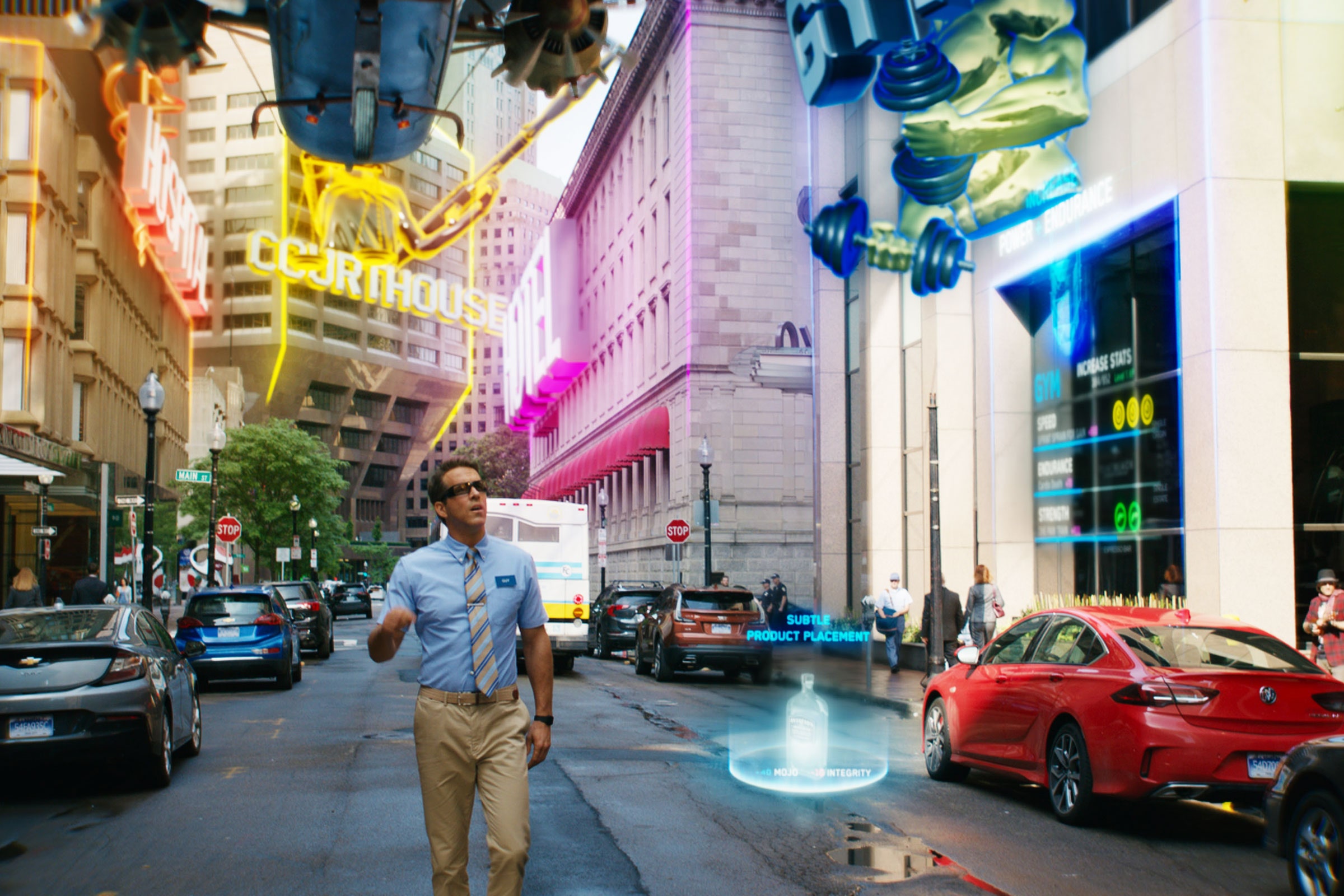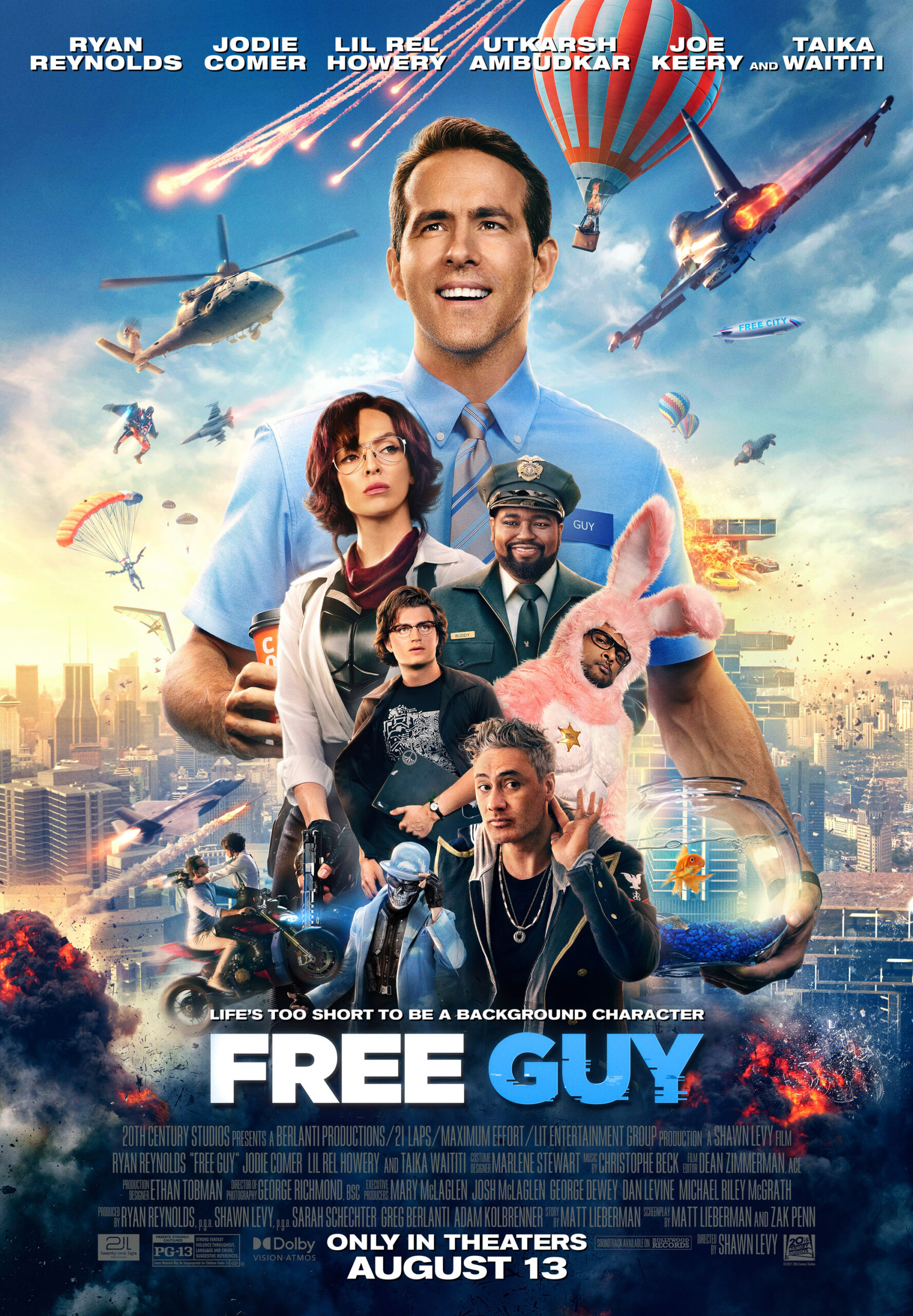
Free Guy is Tron for the age of downloadable content. No, really. Change the polarity of a few of the characters and the mechanism by which a “real” person enters the world of the game, and Free Guy is Tron with a Gen-Z twist.
You remember the plot of Tron, right? Or maybe it never really made sense to you. Tron doesn’t make logical sense in the same way that fantasy stories of all kinds don’t make sense. Why things happen in a true fantasy is never as important as how characters react. They are character narratives. Characters have their character tested by remarkable events. If they are true, they come out more resilient on the other side of the trial.
In Tron, in the “real world,” roughish video game programmer Flynn has had his code stolen by a colleague who used it to build his video game empire. While attempting to pull proof off the bad guy’s servers, Flynn gets sucked into the game by a nefarious artificially intelligent security program. He teams up with a couple of programs on the inside to find a way out. It turns out programs are personified within the matrix of computers and have their own society complete with their own religion. It’s the story of an upstart genius versus the corporate baddie with a dash of techno-theology to spice things up. Free Guy is Tron with an aw-shucks A.I.
In 1982 when Tron lightcycled through cinemas (and confused most people) video games were dots and lines bouncing around arcade screens. Now video games are pervasive, and they are photo realistic. So Free Guy is less visually distinctive and much easier to understand. Even the two movies’ stars bespeaks the change. Jeff Bridges has always favored the odd film. Ryan Reynolds has become adept at choosing movies sure to please and never confuse audiences. Forty years later, Tron is still a strange watch. Free Guy is summer blockbuster fun.
Maybe computers were more magical in 1982 when the average moviegoer wasn’t sneaking peaks at the one they carry in their pocket in the middle of watching the movie. Back then, computers were an unexplored frontier. Today virtual reality feels like a plane of existence much closer to home, like going to the office, a place we could pack up and move to in the near future if we so desire. Logging on is pedestrian. It’s like going to the grocery store or, if you’re really intense about it, like eat-pray-loving across Italy. It’s adventurous, sure, but in the most basic, privileged way. It’s something we do to find ourselves or to find a good deal on a pair of pants.
Free Guy is fun, which is exactly what it intends to be. I miss Tron’s mystery though. Tron cribs liberally from Christological symbolism. Many movies do. (If I had a nickel for every Christ figure in a movie…) But in copy/pasting Jesus onto its digital myth, Tron brings along some of the speculation about the horizons of human potential inherent to the Incarnation. Free Guy leaves you chuckling about its cameos, soothed in your recognition of its many references to other pop-culture properties. Tron leaves you asking a question that has the potential to lead you to some revelatory places – “What was that?”
Free Guy is Tron for the age of downloadable content. No, really. Change the polarity of a few of the characters and the mechanism by which a “real” person enters the world of the game, and Free Guy is Tron with a Gen-Z twist.
You remember the plot of Tron, right? Or maybe it never really made sense to you. Tron doesn’t make logical sense in the same way that fantasy stories of all kinds don’t make sense. Why things happen in a true fantasy is never as important as how characters react. They are character narratives. Characters have their character tested by remarkable events. If they are true, they come out more resilient on the other side of the trial.
In Tron, in the “real world,” roughish video game programmer Flynn has had his code stolen by a colleague who used it to build his video game empire. While attempting to pull proof off the bad guy’s servers, Flynn gets sucked into the game by a nefarious artificially intelligent security program. He teams up with a couple of programs on the inside to find a way out. It turns out programs are personified within the matrix of computers and have their own society complete with their own religion. It’s the story of an upstart genius versus the corporate baddie with a dash of techno-theology to spice things up. Free Guy is Tron with an aw-shucks A.I.
In 1982 when Tron lightcycled through cinemas (and confused most people) video games were dots and lines bouncing around arcade screens. Now video games are pervasive, and they are photo realistic. So Free Guy is less visually distinctive and much easier to understand. Even the two movies’ stars bespeaks the change. Jeff Bridges has always favored the odd film. Ryan Reynolds has become adept at choosing movies sure to please and never confuse audiences. Forty years later, Tron is still a strange watch. Free Guy is summer blockbuster fun.
Maybe computers were more magical in 1982 when the average moviegoer wasn’t sneaking peaks at the one they carry in their pocket in the middle of watching the movie. Back then, computers were an unexplored frontier. Today virtual reality feels like a plane of existence much closer to home, like going to the office, a place we could pack up and move to in the near future if we so desire. Logging on is pedestrian. It’s like going to the grocery store or, if you’re really intense about it, like eat-pray-loving across Italy. It’s adventurous, sure, but in the most basic, privileged way. It’s something we do to find ourselves or to find a good deal on a pair of pants.
Free Guy is fun, which is exactly what it intends to be. I miss Tron’s mystery though. Tron cribs liberally from Christological symbolism. Many movies do. (If I had a nickel for every Christ figure in a movie…) But in copy/pasting Jesus onto its digital myth, Tron brings along some of the speculation about the horizons of human potential inherent to the Incarnation. Free Guy leaves you chuckling about its cameos, soothed in your recognition of its many references to other pop-culture properties. Tron leaves you asking a question that has the potential to lead you to some revelatory places – “What was that?”


Elijah Davidson is Co-Director of Brehm Film and Senior Film Critic. Find more of his work at elijahdavidson.com.
The Green Knight is the old tale told rather straight with a gothic sensibility, meaning there are no contemporary action theatrics to see here, just weird fantasy stuff.